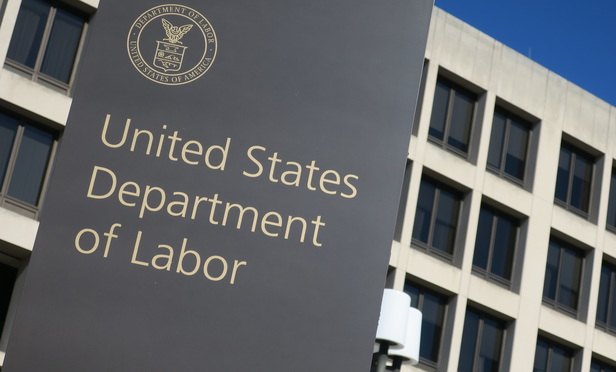 Labor Department headquarters inWashington. (Photo: Mike Scarcella/ALM)
Labor Department headquarters inWashington. (Photo: Mike Scarcella/ALM)
The Department of Labor said late Monday afternoon that it isproposing a new exemption for investment advice fiduciaries,allowing them to receive "a wide variety of payments that wouldotherwise violate the prohibited transaction rules."
|Those payments include "commissions, 12b-1 fees, trailingcommissions, sales loads, mark-ups and mark-downs, and revenuesharing payments from investment providers or third parties" andwould extend to rollover advice, according to the proposal.
|"Today's proposed exemption would give Americans more choicesfor investment advice arrangements, while protecting the retirementsavings of American workers," said Labor Secretary Eugene Scalia,in a statement. "The exemption would add to the tools individualsneed to make the right decisions for their financial future."
|In a tweet, Barbara Roper, director of investorprotection for the Consumer Federation of America, said the rule "reopens loopholes in the definition of fiduciary investment advice, making the standard easy to evade. It creates a new exemption to allow advisers to get conflicted compensation, subject only to Reg BI's weak, non-fiduciary standard."
|Labor's Employee Benefits Security Administration plansto soon send its proposed new exemption to align with theSecurities and Exchange Commission's Regulation Best Interest tothe Federal Register, which will open it up for a public commentperiod, a senior Labor official told reporters Monday.
|Dale Brown, president and CEO of the Financial ServicesInstitute, said in a Monday statement that FSIis "thoroughly reviewing the rule proposal. However, weexpect the Department heeded the concerns outlined by the FifthCircuit Court of Appeals and consulted with the SEC to avoidconflicts" with Reg BI.
|"These regulations must work in tandem to prevent conflictingrequirements for financial advisors working to diligently complywith the rules and to avoid creating confusion among investors,"Brown said. "This will also ensure Main Street Americans haveaccess to the quality, affordable financial advice they need toachieve their financial goals."
|The senior Labor official explained that under the proposed newexemption from ERISA's prohibited transaction rules,Labor "is not changing the definition of fiduciary," andthe 5-part test under ERISA "remains intact."
|The Labor official also explained that the best intereststandard in DOL's exemption "is aligned" with Reg BI "and theexisting fiduciary duty of SEC-registered investment advisors."
|Labor's rule, which is in the form of a prohibited transactionexemption, fulfills two important policy goals, according to asenior Labor Department official who briefed reporters. A factsheet about the exemption is available here.
|First, it facilitates a wide range of beneficial investmentadvice and services to ERISA plans and IRA investors, the seniorofficial said.
|Second, "it ensures that when retirement investors receiveadvice pursuant to the exemption, that advice is in their bestinterest," the senior official said.
|The proposed exemption offers a new prohibitedtransaction class exemption for investment advice fiduciaries andis based on an existing temporary policy adopted after the U.S. 5thCircuit Court of Appeals vacated Labor's 2016 fiduciary rulepackage.
|"The proposal would allow investment advice fiduciaries to givemore choices for retirement using impartial conduct standards,"Labor explained.
|Impartial conduct standards are a best-interest standard; areasonable compensation standard; and a requirement to make nomaterially misleading statements.
|The standards in Labor's proposed exemption "align withstandards of other regulators, including the SEC," Labor said.
|The exemption also expresses Labor's "views on when rolloveradvice could be considered fiduciary advice" under the EmployeeRetirement Income Security Act and the Internal Revenue Code.
|The exemption includes additional conditions requiring "a clearacknowledgement of the advisor's fiduciary status," policies andprocedures to mitigate conflicts of interest and a retrospectivecompliance review by financial institutions to ensure ongoingcompliance with the exemption condition, the senior Labor officialexplained.
|The exemption also includes a "disqualification provision," thesenior official said.
|Labor is also amending the Code of Federal Regulations toimplement the U.S. Court of Appeal's 5th Circuit's orderand reinstating Labor's 1975 regulation defining who is aninvestment advice fiduciary under ERISA and the Code, commonlyknown as the "five-part test."
|The court's order "also had the effect of reinstating theDepartment's Interpretive Bulletin 96-1 regarding participantinvestment education," Labor explained.
|SEC Chairman Jay Clayton said of the proposal: "I commend the Department of Labor for their efforts to clarify and align the standards of conduct that investment professionals must follow in providing advice to Main Street investors. The proposed exemption announced today reflects in part the Commission's constructive and ongoing engagement with the Department. I look forward to continuing our work with the Department so that collectively we can enhance investor choice and increase investor protections."
|READ MORE:
Complete your profile to continue reading and get FREE access to BenefitsPRO, part of your ALM digital membership.
Your access to unlimited BenefitsPRO content isn’t changing.
Once you are an ALM digital member, you’ll receive:
- Critical BenefitsPRO information including cutting edge post-reform success strategies, access to educational webcasts and videos, resources from industry leaders, and informative Newsletters.
- Exclusive discounts on ALM, BenefitsPRO magazine and BenefitsPRO.com events
- Access to other award-winning ALM websites including ThinkAdvisor.com and Law.com
Already have an account? Sign In
© 2024 ALM Global, LLC, All Rights Reserved. Request academic re-use from www.copyright.com. All other uses, submit a request to [email protected]. For more information visit Asset & Logo Licensing.








